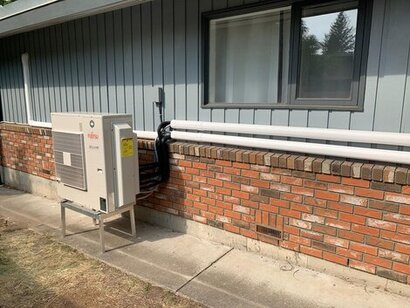
The company is supported by key partners – the University of Bradford, Bradford College, and Bradford Courts. It recently broke ground on its energy centre and its novel approach is aimed at combining £75 million or private capital with public investment in Bradford to provide a blueprint to decarbonise cities and towns across the UK. The total investment includes £20 million from the UK Government’s Green Heat Network Fund.
Using Bradford as a blueprint, 1Energy has ambitions to deploy £1bn within the next eight years into building new city-wide, low-carbon heat networks across the UK, with its innovative model providing the lowest cost, simplest and fastest route to decarbonising heat at scale and a long-term foundation for healthier, greener cities.
This will be primarily funded by investment from UK and global institutional investors through Asper Investment Management's dedicated fund, which supports the development, construction and operation of 1Energy’s heat networks.
These networks will play a key role in achieving Britain’s climate goals by providing a locally generated, sustainable alternative to heat produced by fossil-fuel gas boilers, which currently powers over 2 million businesses and 24.5 million homes, throughout the UK.
The Bradford Energy Network, for example, is projected to reduce the carbon emissions from heating connected buildings by 80 per cent during its first phase, supporting the council’s city-wide net zero targets. Through reducing the country’s reliance on gas for heating, the networks will also bolster energy security while protecting public and private sector organisations against sudden changes in prices.
City and town councils, universities, colleges and other leading public sector organisations have set net zero targets that require rapid decarbonisation of heating to drive down emissions. While individual building-level heat pumps can play a role in this for some organisations, they cannot be scaled rapidly or economically enough to support a rapid, low-cost city-wide decarbonisation of heat.
Heat networks offer a viable solution, providing huge efficiencies of scale. Connecting to a heat network is the lowest cost way to reduce carbon emissions from heating at scale, with upfront and operational costs significantly less than individual building-level heat pumps.
To date, the majority of private heat network developers have been focusing on building heat networks for new buildings, which represents 20 per cent of the challenge. This is due to the complexity and costs associated with decarbonising heat in cities and towns – with existing buildings requiring a variety of retrofit measures.
By deploying significant investment and expertise and facilitating the retrofitting of existing properties, 1Energy will address the dominant 80 per cent of the problem, tackling around one third of Britain’s total carbon emissions.
“We cannot reach net zero without decarbonising heat” said Andrew Wettern, CEO of 1Energy. “We are proud to be delivering a city-wide solution to this challenge for Bradford alongside the University of Bradford, Bradford College, and Bradford Courts. The Bradford Energy Network is a flagship project in the UK’s transition to low carbon heating. Crucially, it also provides a blueprint for national rollout, successfully demonstrating how to: deploy institutional investment alongside Government funding, deliver savings for customers in the transition, and decarbonise existing and new buildings across a city through an exemplar low carbon heat network. The project is already delivering significant social value and wider benefits to the city – creating new jobs and skills, utilising the local supply-chain and creating a more favourable environment for inward investment into Bradford. Thanks to the support of our key partners, we are able to put Bradford right at the very forefront of decarbonised, healthier cities in the UK and to assist its regeneration and growth.”
The Bradford Energy Network will play a key role in driving a just transition, addressing environmental, health, and economic challenges at the same time. By replacing gas boilers with heat network connections, as well as reducing carbon emissions, the project will reduce other forms of air pollution from heating by 75 per cent during its first phase, aiming to further reduce this in future. Additionally, the project will save its three key partners 29,7809 tonnes of carbon dioxide, equivalent to taking over 21,360 cars off the road.
Representing 54 per cent of the carbon savings among the key partners, the University of Bradford aptly led the charge on behalf of its students – the nation’s next generation of political leaders and engineers.
Through combining long term or 'patient' private capital and public investment, the project will support a brighter future for both Bradford – the country’s youngest city and next UK City of Culture – and Yorkshire. Combined with other regional developments, such as the West Yorkshire Mass Transit system, the Bradford Energy Network is laying the foundations for a net zero city. The network will make the area an even more attractive place to invest in and accelerate the growth of the local low carbon employment sector.
“This represents a pivotal moment for the city and the UK” added Professor Shirley Congdon, Vice-Chancellor of the University of Bradford. “As an anchor customer of the Bradford Energy Network and strategic partner of UK City of Culture 2025, we are proud to have played a vital role in helping build a healthier, greener Bradford. The network provides an opportunity to show the government how to build a brighter future for young people across the country, with other cities following in Bradford’s footsteps. It shows how we as a university, are enabling positive change, for people and planet.”
For additional information:

